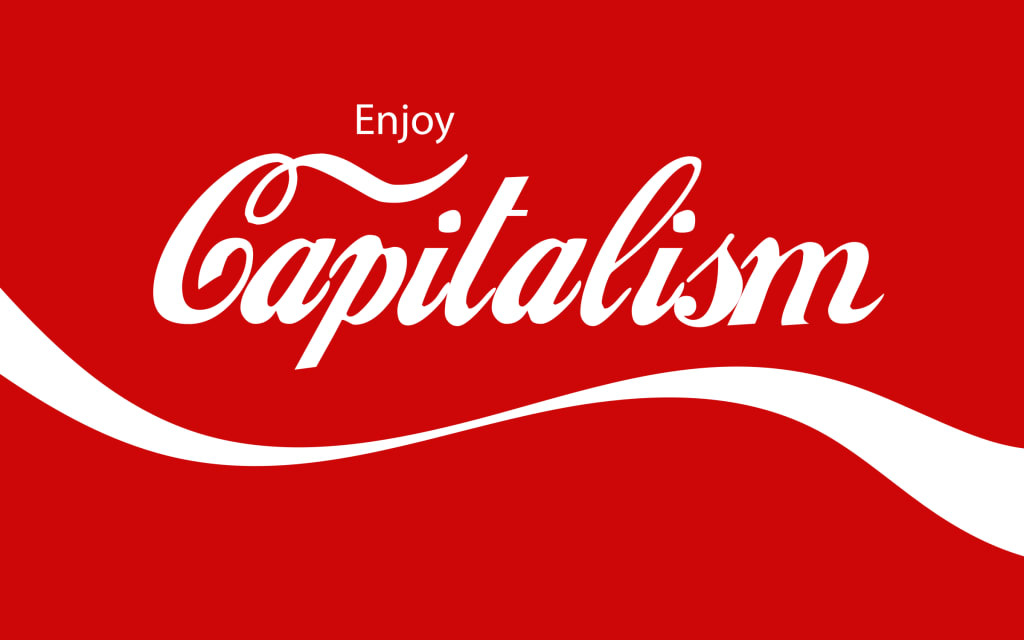What's the Point in Capitalism?
In a stagnant economy, we're all running to stand still.

It’s the time of year where, once again, the masses flock to their tablets, laptops and phones to spends billions of pounds on discounted electronics, toys and beauty products only to later realise that a majority of the stuff on sale on Black Friday is actually crap and is more or less the same price all year round.
Is there a better demonstration of Capitalism at work than a completely invented holiday purely to buy cheap shit? As is often the case, the craze started in the US as a way for retailers to shift their unwanted crappy stock before Christmas, or to generate interest in the lead up to the holiday.
Traditionally the day after Thanksgiving, that holiday which celebrates Native Americans being fucked over, it’s a day dedicated to excess and the growth of personal debt. It’s a fitting prelude to Christmas, too, with Jesus presumably shedding bitter tears that his birthday has been changed from a celebration of love and togetherness into the John Lewis annual advert campaign.
If this is Capitalism in microcosm, then it makes you wonder: what’s the fucking point?
It’s a perfectly reasonable question to ask, given the circumstances; the budget recently delivered by the chancellor made for some pretty grim reading when it comes to earnings and standards of living.
The Institute for Fiscal Studies (IFS) called it astonishing that, according to government figures, earnings would be below their 2008 levels in 2022. 14 years after the financial crash and we’re now discussing a situation where people are still earning less than before it happened.
Imagine that for a moment – Barely anybody in this country, in real terms, will be earning more money in 5 years time than they were in 2008. 14 years. No better off.
All of the eye-catching gimmicks in the world can’t distract from the fact that, in a Capitalist society, nobody can accrue any capital. You’d be perfectly reasonable in suggesting that it’s only fair that you work hard for nearly 15 years and, after that time, manage to build your capital and grow it.
If the whole point of having a system based around money, accruing money, growing money, and purchasing items capable of growing that money, is to give you that opportunity, then at what point does it cease to be fit for purpose?
The dictionary definition of Capitalism is “an economic and political system in which a country's trade and industry are controlled by private owners for profit, rather than by the state.”
It’s an interesting concept, really. In opposition to, say, Socialism, where industry and trade is controlled by the state (depending which strand you subscribe to), capitalism has been the greatest driver for improvement in living conditions in human history. On paper and in history its worked.
But are we, really, in a post-capitalist world? Many have spoken about the supposed “neo-liberal consensus” or “free market economy”.
What do they mean? The neoliberal, or free market, approach is simple; everything will find its true value and everything will find the most efficient way to work if it’s left up to business. If the state starts a pencil business, for example, to supply the masses with pencils, then free market theory suggests that there’s no incentive for them to make the best pencils.
Why would they? There’s no competition? And because there are no profit incentives, there’s no incentive for the management to make the business perform any better. Because there is no tangible “market”, there’s nobody to compete with, there are no customers and there's no incentives to do better.
The only problem with this ideology is that it presumes the worst in people. Why wouldn’t people want to do a good job? Why wouldn’t people want to make the best products they can? Why would managers automatically want to rinse as much money possible for as little work possible? It assumes that everybody is greedy and on the take.
It would be naïve, of course, to assume that everybody is altruistic and wants to do the honourable thing. That’s not realistic and that’s why we must find balance.
Two examples of privatisation working and not working can be seen in BT and the railways.
Years ago when British Telecom were the only provider of telephone services they were inefficient, expensive and their customer service was abysmal. What were you going to do, though? Move to somebody else? They had a complete monopoly over the entire network. Then the government stepped in, made them open it up to other providers who could provide phone and broadband through their network and, suddenly, the price dropped down and the service improved almost immeasurably. The reason why you can get free broadband for 12 months with an offer on your line rental and an engineer within 48 hours is because if companies didn’t offer that, you’d simply move to another provider. Thanks to competition watchdogs ensuring that BT didn’t have a monopoly and act fairly, you now get good quality broadband at cheap prices. But – there was balance. The market was allowed to promote competition, whilst being overseen by OFCOM and competition watchdogs (the state), to ensure fairness.
Now look at the railways. The trains are often slow, late, polluting and uncomfortable. In 2017 the train line between Sheffield and Manchester, two huge European cities, still operates a diesel 3 carriage train from the 1970’s. What are you going to do though? Wait for the next train company to come along? That’s right, you can’t because there’s only one and it’s run by somebody else’s government overseas. There is no competition, they’re massively subsidised by the government and they’re overpriced and inefficient. The markets, on this occasion, have failed us. This represents something else entirely, though, and that’s cronyism.
The problem you find when capitalism reaches its natural conclusion under free-market ideology is that all the money has risen to the top. Huge organisations with little incentive to invest and innovate lumber higher up the chain, and due to government inaction exploitative and immoral businesses like Uber and Deliveroo and Hermes thrive; offering insecure work for poor wages, knowing that the government have made the welfare system so shameful and difficult to navigate that people would rather work long hours for barely any money amidst rising costs rather than be seen to be begging at the job centre.
Companies like Starbucks and Google who have little or no interest in paying the adequate taxation to run the country they exploit fail also to invest significantly enough to prove any real innovation.
In an era of ‘globalisation’, is it really any wonder , as those at the top get richer and those at the bottom get relatively poorer, that people vote for things like Brexit? Why should they trust anybody when their weekly shop has risen by 20% in two years?
So what’s the solution to a stagnant economy where prices rise quicker than people can increase their salary? It’s not an easy one.
Productivity, quite simply, is the issue. The OECD says “Productivity is commonly defined as a ratio between the output volume and the volume of inputs. In other words, it measures how efficiently production inputs, such as labour and capital, are being used in an economy to produce a given level of output.”
So, if you work in a shoe factory, how efficiently are the business owners using your labour and their money to increase productivity and profits? One way would be to invest in easier to use machines, for example. One way would be to increase your pay to incentivise you to work harder. It could be a mix of the two. But if the CEO of the shoe factory earns, on average, 276 times more than the people on the production line for doing a job that almost by any calculation isn’t 276 times more productive, then perhaps we have a problem.
Perhaps greedy, tax evading bastards at the top have convinced too many people that they’re 276 times better than they are. Perhaps it might be time for communities to come together and pool their own wealth and resources to their own ends.
Is there land in your community that isn’t used? Why not come together to purchase it from the council to farm food from? Why not have people with an equal share of the business working for equal pay? Why not have the community buy housing and rent it out at a fair price?
The opportunities are endless and in age where everything has a transactional value, perhaps it’s time to change the rules so that the people can create their own wealth.
About the Creator
Will Leyland
Journalist and writer based in Manchester. Studied English Literature with English Language at The University of Salford. Interested in politics, economics and Manchester United. Labour member since Millibae






Comments
There are no comments for this story
Be the first to respond and start the conversation.